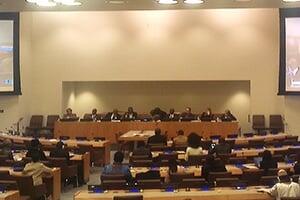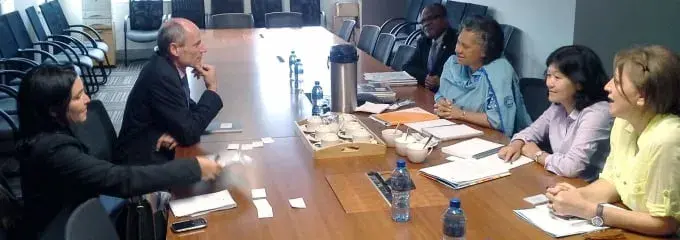UNITED NATIONS, New York – The growing number of young people in Africa could offer enormous potential gains to the continent, but only if their needs are met and their rights are fulfilled. This was the central message of leaders and public health experts at an 11 April meeting on Africa’s ‘demographic dividend’ at the United Nations Headquarters.
The population of young people is growing rapidly in Africa, even as numbers of young people are projected to decline in most other parts of the world, according to the recent UN Secretary-General’s report on world demographic trends. This fact, coupled with declining fertility rates, means Africa has the opportunity to benefit from a demographic dividend – a potential economic boom that occurs when falling fertility rates coincide with a growing working-age population.
The discussion, a side event of the 2014 Commission on Population and Development, focused on how African countries can make the most of this opportunity. The key, said speakers, is to help young people fulfil their individual potential, empowering them to bring benefits to their communities, their countries and the world.
“In Africa, over 30 per cent of the population is between the age of 10 and 24, and will remain so for at least the next 20 years. This burgeoning youth population is a challenge for the region, but it also could be an opportunity – and our greatest asset,” said Dr. Babatunde Osotimehin, Executive Director of UNFPA, the UN Population Fund. “Africa’s young people have the potential to be a powerful engine for development. But to realize this potential, we must invest in them, address their particular needs, include them in decision-making and empower them to become agents of change.”
Listening to young people
“Africa is home to the youngest and most productive population in the world,” said Corinne Woods, Director of the UN Millennium Campaign. “This is added to the fact that the fastest developing economies today are in Africa. And this presents enormous opportunities for growth and transformation. Africa’s present and future belong to its youths.”
She urged governments to be responsive to young people’s needs and demands. Surveys have shown “that citizens understand what it will take to achieve socioeconomic transformation and human development. Added to this, they also appreciate the bottlenecks impeding their achievement of livelihood ambitions as well as the responsibilities of governments and other stakeholders to deal with these challenges,” she said.
“Harnessing youthful energy is a sure pathway to peace, prosperity and growth,” she added.
Youth need the tools to succeed
The UNFPA’s Regional Director for West and Central Africa Benoit Kalasa warned that governments must do more to ensure young people have the opportunities and tools necessary to succeed. “Employment opportunities are few,” he said, adding, “We need to empower women and ensure gender equality… And we need jobs, jobs and jobs.”
Young women must not be left behind, Dr. Osotimehin noted: “If Africa is to take advantage of this demographic transition, as other regions have done, we must invest specifically in our daughters and ensure that each young person and each adolescent girl has access to education and quality health care, including comprehensive sexuality education and reproductive health services.”
He also emphasized the importance of equipping young people with the knowledge needed to protect themselves from adolescent pregnancy and HIV. “Every day we lose young women unnecessarily, and this has to stop,” he said.
The event was organized by the Permanent Mission of Nigeria to the UN, in collaboration with the MacArthur Foundation, Plan USA, the Ford Foundation and the UN Millennium Campaign. Participants at the event included UNFPA and the Johns Hopkins School of Public Health’s Bill and Melinda Gates Institute for Population and Reproductive Health.




